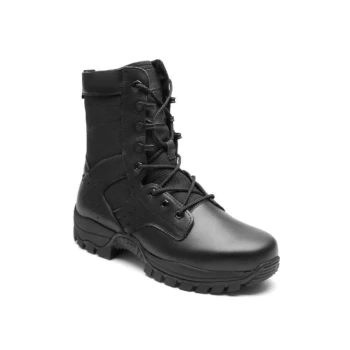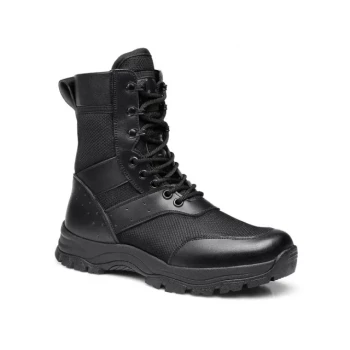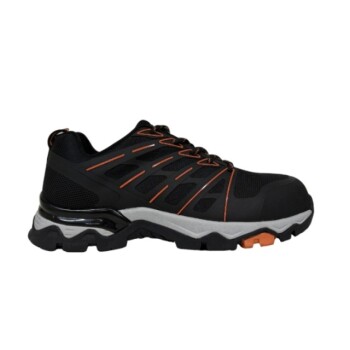The value of elephant leather is rooted in two extremes: its sourcing is strictly limited by conservation laws, making it exceptionally rare, while its physical properties make it one of the most rugged and durable materials available for bootmaking. This combination of regulated scarcity and functional toughness is what makes it so prized.
Elephant leather's prestige comes from a unique paradox: it is a luxury material defined not by delicacy, but by its incredible resilience and the strict ethical regulations that govern its sourcing from animals that have died of natural causes.

The Core Reasons for Its Rarity and Value
The reputation of elephant leather isn't just marketing; it's built on a foundation of legal mandates and exceptional performance characteristics that set it apart from all other hides.
The Ethical Sourcing Mandate
The primary driver of elephant leather's rarity is regulation. It can only be legally harvested from animals that have died from natural causes, often in nationally managed parks in Africa.
This process is strictly controlled to ensure that the leather trade does not create a market for poaching. Because the supply is entirely dependent on natural mortality, it is inherently limited, unpredictable, and scarce.
Unmatched Durability and Texture
Beyond its rarity, elephant leather is valued for its incredible toughness. It is thick, dense, and highly resistant to scuffs, scratches, and punctures.
This makes it one of the few exotic leathers that is not just suitable but ideal for a hard-wearing work boot.
Aesthetically, the leather is unmistakable. It features a deep, wrinkled grain with unique cracks and fissures, meaning no two pairs of boots are ever identical. This texture provides a rugged, yet sophisticated, appearance.
The Practical Realities of Owning Elephant Leather
Understanding the material's performance and maintenance needs is crucial for any potential buyer. It behaves differently than common cowhide or more delicate exotic skins.
Performance Under Pressure
The inherent toughness of elephant hide translates directly to the performance of the boot. It excels in abrasive environments where other leathers would quickly show wear.
Despite its ruggedness, the leather is breathable and will conform to the wearer's foot over time, offering a comfortable and custom fit once broken in.
The Maintenance Commitment
While tough, elephant leather requires diligent care. It is a porous hide that can dry out and crack if neglected.
Regular cleaning and conditioning with products specifically designed for exotic leathers are essential to keep the hide nourished and prevent it from becoming brittle. This is a higher maintenance commitment than for standard cowhide.
Understanding the Trade-offs
Elephant leather is a significant investment with clear benefits, but it also comes with practical considerations that every owner must be aware of.
The High Cost of Rarity
The legally restricted supply chain and high demand naturally result in a premium price. Elephant leather boots are among the more expensive options in the exotic boot market.
Verifying Legitimate Sourcing
As a buyer, it is critical to purchase from a reputable bootmaker who can provide documentation of the leather's legal and ethical sourcing. The burden of proof is on the seller to demonstrate compliance with international conservation laws.
The Break-In Period
Due to its thickness and density, the break-in period for elephant leather boots can be longer than for softer leathers. However, this process results in a boot that is perfectly molded to your foot for long-term comfort.
Is Elephant Leather the Right Choice for You?
Choosing an exotic leather depends entirely on your priorities, from pure aesthetics to functional demands.
- If your primary focus is maximum durability: Elephant leather is one of the toughest, most scuff-proof options you can choose, making it an excellent investment for a lifetime boot.
- If your primary focus is a unique aesthetic: The deep, craggy texture of elephant hide is instantly recognizable and makes a powerful statement of rugged luxury.
- If your primary focus is low maintenance or budget: A high-quality cowhide or a more common exotic like caiman may be a more practical and cost-effective choice.
Ultimately, choosing elephant leather is an informed decision to invest in a material defined by its unparalleled toughness and ethical rarity.
Summary Table:
| Aspect | Key Characteristic |
|---|---|
| Rarity | Sourced only from animals that die of natural causes under strict conservation laws. |
| Durability | Extremely thick, dense, and highly resistant to scuffs, scratches, and punctures. |
| Aesthetic | Unique, deep, wrinkled grain; no two hides are identical. |
| Maintenance | Requires regular conditioning with exotic leather products to prevent drying. |
| Break-In | Longer break-in period due to density, but results in a custom fit. |
Ready to Invest in Unmatched Durability?
As a large-scale manufacturer, 3515 produces a comprehensive range of rugged footwear for distributors, brand owners, and bulk clients. Our production capabilities encompass all types of durable shoes and boots, including those made from premium exotic leathers.
Let us help you source or create the perfect, high-performance boot for your market. Contact our expert team today to discuss your manufacturing needs and how we can bring value to your business.
Visual Guide

Related Products
- Wholesale Leather Work Boots with Customizable Wedge Sole for Brands
- Durable Leather Work Boots Wholesale Manufacturer & Custom Factory
- Durable Leather Work Boots for Wholesale & Custom Manufacturing
- Durable Goodyear Welt Leather Work Boots for Wholesale & Private Label
- Durable Leather Tactical Boots Wholesale & Custom Manufacturing for Brands
People Also Ask
- What role does the HIPORA polyurethane membrane play as a barrier layer in protective gear? High-Tech Moisture Shield
- How do material handling robots contribute to production flexibility in footwear FMS? Key Automation Benefits
- How do electronic buzzer components optimize smart footwear prototypes? Enhancing Accessibility via Auditory Feedback
- What are the risks of uncertified natural rubber? Avoid Deforestation and Human Rights Abuses
- What is the trick to making a Canadian Tuxedo and cowboy boots less cliché? Modernize with Strategic Contrast
- What are some effective ways to keep feet warm during winter cycling? A Complete Guide to Warm Feet
- What is the 60-Day Comfort Guarantee? Get a Risk-Free Boot Purchase
- Why is research into the durability and stretchability of fabrics essential for smart gear? Optimize Safety Designs



















